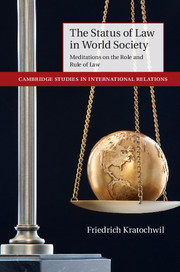Book contents
- Frontmatter
- Dedication
- Epigraph
- Contents
- Preface
- Introduction: images of law
- Meditation 1 Inter-disciplinarity, the epistemological ideal of incontrovertible foundations, and the problem of praxis
- Meditation 2 On the concept of law
- Meditation 3 On constitutions and fragmented orders
- Meditation 4 Of experts, helpers, and enthusiasts
- Meditation 5 The power of metaphors and narratives: systems, teleology, evolution, and the issue of the “global community”
- Meditation 6 Cosmopolitanism, publicity, and the emergence of a “global administrative law”
- Meditation 7 The politics of rights
- Meditation 8 The limits and burdens of rights
- Meditation 9 The bounds of (non)sense
- Index
- References
Meditation 2 - On the concept of law
Published online by Cambridge University Press: 05 June 2014
- Frontmatter
- Dedication
- Epigraph
- Contents
- Preface
- Introduction: images of law
- Meditation 1 Inter-disciplinarity, the epistemological ideal of incontrovertible foundations, and the problem of praxis
- Meditation 2 On the concept of law
- Meditation 3 On constitutions and fragmented orders
- Meditation 4 Of experts, helpers, and enthusiasts
- Meditation 5 The power of metaphors and narratives: systems, teleology, evolution, and the issue of the “global community”
- Meditation 6 Cosmopolitanism, publicity, and the emergence of a “global administrative law”
- Meditation 7 The politics of rights
- Meditation 8 The limits and burdens of rights
- Meditation 9 The bounds of (non)sense
- Index
- References
Summary
Introduction
That nations dwell in anarchy has been the mainstay lore of realists of different stripes. Yet even Hobbes realized that things are not that simple. He distinguished the “misery” of the state of nature among individuals from that which prevails among “persons of sovereign authority.” Contrary to the necessity of transcending the war of all against all, states can counteract the dangers that arise in the case of individual vulnerability. They can organize police forces and a military, and contract alliances, thereby providing at least a modicum of security. Moreover, through establishing a public order, states create incentives for the development of a “commodious living” that comes to a naught when no sovereign keeps all of his subjects “in awe.”
Those realists, who were not captured by certain “assumptions” by which the homo politicus has to maximize power analogous to the homo economicus’ amassing of revenue, but who were more historically inclined, as they were interested in the actual functioning of the (European) state system, paid close attention to the conventions and institutions facilitating the relations among “persons of sovereign authority.” Thus the institution of treaty making (bilaterally or in congresses), of the acquisition of titles and their transfers, and the attempts to regulate the use of force (ius ad bellum and in bello) emerged quickly as core concerns for a systematic analysis. Hume had already considered these norms and institutions as fundamental in the sense that without the establishment of certain normative expectations in regard to those concerns, no social system can reproduce itself.
- Type
- Chapter
- Information
- The Status of Law in World SocietyMeditations on the Role and Rule of Law, pp. 50 - 74Publisher: Cambridge University PressPrint publication year: 2014



